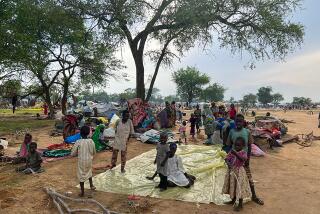Sudan Civil War Endangers Cattle-Rich Culture
THIET, Sudan â Their lanky limbs whitened with ash to keep off mosquitoes, children emerge eerily from the morning mist to tend the cattle crowding a Dinka camp.
Their elders fear it is a sight that may soon disappear.
They worry that the accumulating ravages of Sudanâs long civil war will rob this young generation of a cattle-based culture that has survived thousands of years, through drought, disease and famine.
âIf I lose a house, I can build it back. If I lose a cow, I can steal another. But if I lose a culture, I have lost it forever,â said Mario Muor Muor, chief of the Sudan Relief and Rehabilitation Assn.
Traditionally, cattle are almost everything for the Dinkas, the biggest tribe in southern Sudan. Cows are a symbol of pride and a measure of wealth. They link children to their parents. Without cattle, Dinkas cannot marry.
In the rainy season, a whole village lives together thriving on the milk of their cows. As the waters recede, the young and the old stay home, while teenage boys and men move tens of thousands of cattle to the edge of the Nile, singing them to sleep as dusk spreads over the marshlands.
The cows--great-horned descendants of the extinct wild cattle of the Nile Valley interbred with lateral-horned Zebu introduced from Asia--are tended from dawn until dusk.
Each morning, girls milk them, then sweep away their dung to dry and burn in smoky fires at night to keep the mosquitoes at bay. They are so at ease with the cows that they wash their hands in a hot jet of cow urine.
Young boys clean the cowsâ coats with ash to discourage ticks.
When the cattle are restless, everyone from toddler to toothless old man clucks to soothe them.
Older boys and men are the protectors. They sleep alongside the family herds to ward off wild animals.
But the war is changing that.
Since 1983, the Sudanese war has pitted north against south, Muslim against Christian, Arab against black.
And in the last year, the Sudanese government has begun to exploit divisions among the southern rebels. They have made allies of some Dinkas and Nuers, the second largest tribe, or at least persuaded them to fight against the majority of Dinkas who support the Sudan Peopleâs Liberation Army.
The unpaid conscripts are encouraged to raid cattle and loot crops to support themselves. They leave behind scorched huts and fields. Hunger and disease often follow for those who survive the attacks.
âBecause of the war, we have lost many cattle, some from disease, more from raids,â said Akon Wol Angic, a tribal leader in Tonj County.
Rustling cattle has long been a rite of passage in a young manâs life, and a way to build a herd.
âBut before, raiders came with spears and fought man against man,â Angic said. âNow they come with machine guns and kill women, children, the young, the old. Everyone.â
He estimated the tribe has lost three-quarters of its cattle to raiders--âthousands and thousands.â He would not be more precise in this culture where asking the size of a herd is like asking a Westerner his salary.
Typically, a small herder has 20 head, a well-to-do man will have 100, and the richest up to 1,000.
When these herds are stolen or killed, the tribe loses a vital source of nutrition through milk, blood and meat, and a source of trade for grain.
But equally as important are the losses to culture.
âIt is our culture in Dinka to have cows. If you donât have cows, you will not be respected. You will be one of the âabur,â the poor people,â said Joseph Lual Bol, acting secretary of the Sudan Relief and Rehabilitation Assn.
The culture also is being undermined because young boys are being lured by the excitement of war and are losing interest in cattle.
âNow many boys think that the center of our culture is guns,â said Deng Ater, 27.
Young Dinkas carry automatic weapons to protect their herds from rivals and to launch raids of their own. At an arms market in War Awaar, an AK-47 assault rifle can be bought for six cows.
Even worse, Muor said, the loss of cattle has made some Dinkas beggars.
âSome have become thieves,â he added. âIt has always been a point of pride to steal a cow, and a taboo to steal food or money. But this is what theyâve turned to.â
More to Read
Sign up for Essential California
The most important California stories and recommendations in your inbox every morning.
You may occasionally receive promotional content from the Los Angeles Times.










